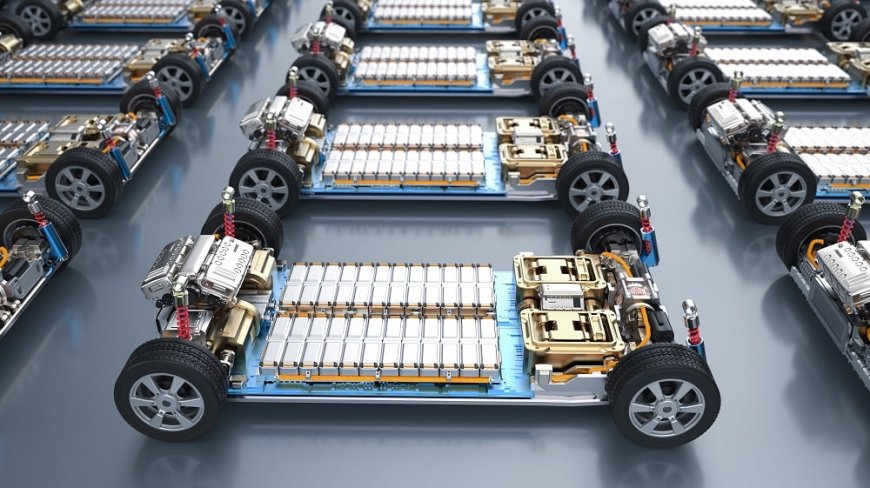Pakistan Launches 2025–30 Plan to Promote Electric Vehicles
In a major step toward a greener and more sustainable future, Pakistan has officially unveiled its Electric Vehicle (EV) Policy 2025–2030. The policy aims to transition 30% of all vehicles to electric power by 2030 and quickly ramp up to 90% EV adoption by 2040, marking a turning point in the country's transportation landscape.

In a major step toward a greener and more sustainable future, Pakistan has officially unveiled its Electric Vehicle (EV) Policy 2025–2030. The policy aims to transition 30% of all vehicles to electric power by 2030 and quickly ramp up to 90% EV adoption by 2040, marking a turning point in the country's transportation landscape.
-
2030 goal: 30% of new vehicle sales — cars, two-wheelers, three-wheelers — to be electric.
-
2040 vision: 90% of new vehicle sales to be EVs.
-
Incentives: Subsidies of PKR 50,000 for e-bikes, PKR 200,000 for e-rickshaws; soft loans at 3% interest over 2 years.
-
Charging infrastructure: Targeting 3,000 stations along motorways and public zones, with an initial focus on 40 sites along the Peshawar–Karachi corridor.
-
Grid support: Electricity tariff for EV charging cut by 44–45%; draft levy on petrol/diesel vehicles to fund EV incentives and infrastructure.
Licenses granted: 57 manufacturers—55 for two/three-wheelers and 2 for four-wheelers—approved to establish local EV plants.
Special zones: 20 plots in technology parks allocated for EV manufacturing, with low-cost land leases up to 50 years.
Customs duties: Just 1% duty on EV parts; 1% duty on CBU EVs till 2027.
E‑bike & rickshaw subsidies: Rs 50,000 & Rs 200,000 respectively, funded via a PKR 4 billion allocated budget.
Low-interest financing: 3% KIBOR monthly installments (~Rs 9,000) over 24 months; credit risk covered by government guarantee.
Fee exemptions: EVs enjoy free registration, no token tax, and exemption from tolls in some regions.
3,000 charging stations across highways and cities by 2030; initial placement at 40 motorway sites.
EV Fund creation: To finance EV deployment, including station set-up and subsidies.
Tariff cuts: Electricity charges for charging operators slashed to ~Rs 39.7/unit.
-
Climate goals: EV adoption will reduce greenhouse gas emissions, helping Pakistan meet its climate commitments.
-
Energy independence: Less dependence on expensive fossil fuel imports; potential annual savings in billions.
-
Economic growth: Local EV production, battery manufacturing, and infrastructure development create new jobs and stimulate export potential.
-
Cleaner air: Major urban centers could see reduced pollution with electric transport replacing conventional vehicles.
-
Government officials highlight that the policy involved stakeholder input, including auto-industry groups like PAMA.
-
PAMA concerns: Industry warns against flooding markets with cheap CBUs, urging balanced policy to protect domestic auto manufacturing.
-
IFC–World Bank partnership: IFC will help develop the EV ecosystem by assisting regulators and standardizing EV two/three-wheelers.
-
Analyst view: While ambitious, EV goals may be slowed by infrastructure gaps, financing bottlenecks, and affordability challenges.
-
Charging infrastructure: A massive rollout of public and private chargers is needed to meet demand.
-
Affordability: Electric passenger cars are still expensive for average consumers; motorcycle and rickshaw subsidies may widen the gap.
-
Policy consistency: A Clear and stable tariff regime is required to reassure investors and charging operators.
-
Local manufacturing readiness: EV parts and battery plants need development; skilled workforce training required.
Pakistan’s 2025–30 EV plan marks a strong push into clean energy mobility. With ambitious targets, generous incentives, and multi-stakeholder investment, the policy has the potential to reshape transport, economy, and environment. Yet, success depends on swift infrastructure scaling, consumer affordability, and industry alignment. With solid execution, Pakistan could emerge as a regional leader in green mobility.

 Ateeq Ur Rehman
Ateeq Ur Rehman